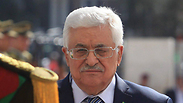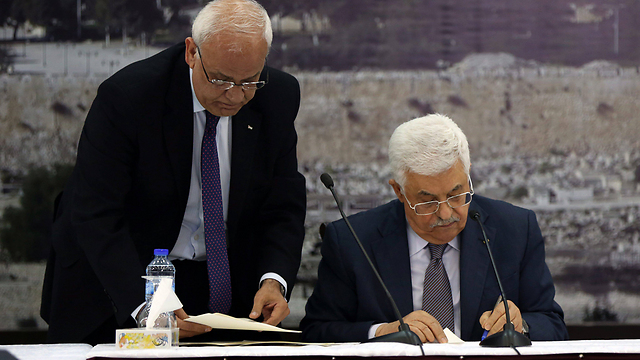
Abbas paves way to join International Criminal Court
Following defeat at the UN Security Council, Palestinian president sends requests to join 20 international treaties - including the Rome Statute.
Following the Palestinian defeat at the UN Security Council, Palestinian President Mahmoud Abbas on Wednesday signed appeals to join 20 international treaties - primarily the Rome Statute, which paves the way for the Palestinians to join the International Criminal Court - live on air during a meeting of the Palestinian leadership in Ramallah.
The Rome Statute of the International Criminal Court is an international treaty that establishes the functions, jurisdiction and structure of the court at The Hague. It has 139 signatories, but the signing is non-binding. Out of that, 122 of the signatories are States Parties.
"They attack us and our land every day, to whom are we to complain? The Security Council let us down - where are we to go?" Abbas told a gathering of Palestinian leaders in remarks broadcast on official television.
"We want to refer to international institutions, and this is one we are referring to, and we'll complain to these people," he added, before signing the documents.
"We knew who was with us and who was against us. In the final moments before the vote, one country rescinded its support of us and it turned into eight votes in favor of the proposal," he said.
"We appreciate the fact two of the votes are of European countries - France and Luxemburg voted in favor. We thank them for their position. I hope in the future the US won't oppose and veto if we can get a majority at the Security Council next time because these proposals only aid to achieve peace in the Middle East."
"The entire region is alight with conflict and what puts off these conflicts is a resolution to the Israeli-Palestinian conflict based on international principles," Abbas continued. "We don't want more than this, but we will also not settle for less than that."
Prime Minister Benjamin Netanyahu was said he wasn't worried about the Palestinian move.
"The one who needs to fear the International Criminal Court at The Hague is the Palestinian Authority, who is sitting in a unity government with Hamas - a declared terrorism organization that like Daesh commits war crimes," Netanyahu said, using the Arab name for the Islamic State.
"We'll take reactive moves and protect the soldiers of the IDF - the most moral army in the world. We will thwart this additional attempt to force diktats on us as we thwarted the Palestinian resolution at the UN General Assembly."
Foreign Minister Avigdor Lieberman was also not concerned by the move.
"Abbas can sign any treaty he wants, the only one committing war crimes in the conflict are the Palestinians, who are responsible for murderous terrorism against babies, children, women and men, indiscriminately for the past century. This even a deaf, blind and mute judge knows. So Abbas can't threaten us - the country with the most moral army in the world," Lieberman wrote on his Facebook page.
Other agreements approved by Abbas included several articles on the court's jurisdiction, commitments against banned weapons and cluster munitions along with less controversial pledges on the political rights of women, navigation and the environment.
"We've been playing Mr. Nice Guy with negotiations since 1991, meanwhile the possibility of a two-state solution erodes," Hanan Ashrawi, a senior Palestinian diplomat, told Reuters.
She added that there were no immediate plans to lodge a formal complaint at the ICC, but that Abbas's move is "a clear signal to Israel and the international community that Israel must cease and desist its war crimes, especially settlements."
The US provides around $500 million dollars in annual economic and security aid to Abbas's administration in the West Bank - money it has docked in the past amid Palestinian bids to confront Israel at the UN.
The US said it objected to actions by both parties "that undermine and create doubts about their commitment to a negotiated peace."
"We strongly oppose Palestinian action at the ICC," a statement from the State Department said. "It would be counter-productive and would do nothing to further the aspirations of the Palestinian people for a sovereign and independent state."
At a Fatah rally earlier on Wednesday, Abbas said that Tuesday's decision by the UN Security Council was not "the end of the world." He said the Palestinian response "will begin tonight."
The Palestinian resolution called for peace with Israel within a year and an end to the "Israeli occupation" of Palestinian territories by late 2017.
The resolution failed to achieve the 9-votes majority required to pass. Eight countries voted in favor of the motion - China, France, Russia, Argentina, Chad, Chile, Jordan, Luxembourg - two opposed - US and Australia - and five abstained - UK, Lithuania, Nigeria, Korea, Rwanda.
Abbas has been under heavy domestic pressure to take action against Israel following months of tensions fueled by the collapse of US-brokered peace talks, a 50-day war between Israel and Palestinian militants in Gaza, a spate of deadly Palestinian attacks on Israeli targets and Israeli restrictions on Palestinian access to a key Muslim holy site in Jerusalem. Tuesday's defeat in the UN Security Council further raised pressure on Abbas to act.
After two decades of failed, on-again, off-again peace talks, the Palestinians have grown disillusioned and decided to seek international recognition of their independence in the absence in various global bodies. While the campaign does not change the situation on the ground, the Palestinians believe the strong international support will put pressure on Israel to allow the creation of a Palestinian state in the West Bank, Gaza Strip and East Jerusalem.
Israel, which captured the three areas in 1967, says Palestinian independence can only be reached through negotiations. It opposes the Palestinian diplomatic campaign as an attempt to bypass negotiations.
The Palestinian campaign scored a major victory in 2012 when Palestine was admitted to the UN General Assembly as a non-member observer state. This upgraded status gave the Palestinians the authority to join dozens of international treaties and agencies.
Still, turning to the International Criminal Court marks a major policy shift by transforming Abbas' relations with Israel from tense to openly hostile. Abbas has been threatening to join the court since 2012, but held off under American and Israeli pressure. The Palestinians can use the court to challenge the legality of Israeli settlement construction on disputed lands and to pursue war crimes charges connected to military activity.
The Associated Press and Reuters contributed to this report.











